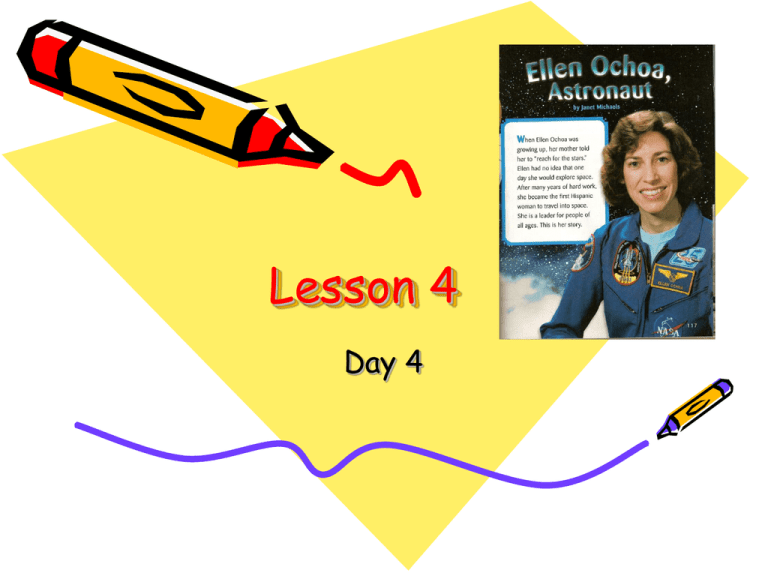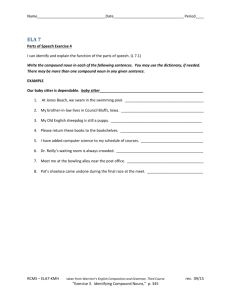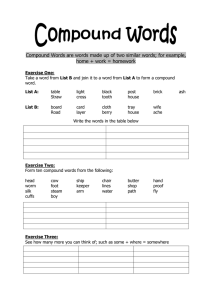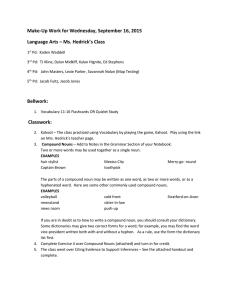Lesson 4 Day 4
advertisement

Lesson 4 Day 4 Question of the Day • What is your special talent? • What talent would you most like to have? • Why would you like to have this talent more than any other? T336 Read Aloud • Why might we want to read the story “Jumping for Joy”? • To learn or enjoy T337 Read Aloud Read Aloud • What did Kiana wish for? • Why did she wish for summer? t337 There are three different ways to form plurals. Adding s – dog; dogs Adding es – fox; foxes Changing y to an i and adding es baby; babies T339 Tell whether each plural noun was formed by adding s, es, or changing the y to an i and adding es. clocks add s parties change y to i, add es cats add s foxes add es dimes add s spies change y to i, add es benches add es prizes add s T338 How many syllables do you hear? clock clocks party parties T338 Some nouns add a syllable when they are made plural. place places bench benches fox foxes face faces T338 ants, toys, flies, things, boxes, games, lines, rocks, wishes, ladies, dishes, babies, bushes, glasses, puppies, families, libraries, brothers, packages, melodies Sort the words into the correct column. Noun + s •ants •toys •things •games •lines •rocks •brothers •packages Noun + es Change y to i •boxes •wishes •dishes •bushes •glasses •flies •ladies •babies •puppies •families •libraries •melodies T338 Good readers read at a comfortable, steady pace and do not stumble over words. Good readers: • pronounce words clearly • listen to themselves read to check their reading pace. T340 As I read a passage from “Ellen Ochoa, Astronaut,” I am going to read at an even speed so that I do not stumble when I get to a harder word. I am going to listen to myself read to hear if I am getting slower or speeding up when I should not be. Turn to page 124-125. Turn and read page 124 with your partner. »Listen as I read. T340 Ellen Ochoa waited for another chance to become an astronaut. While she waited, she joined a space research center. There she helped astronauts learn more about space. She learned to fly a plane and found that she loved to fly. • Read the passage with me. • Read the passage with a partner. Locate Information • Remember when you use information from a book, they need to list the title, author, publisher, and copyright dates. Index: An index is an alphabetical list found in the back of a book. An index lists topics, people, and places mentioned in the book and their page numbers. An index is helpful when searching for a certain word or topic in a book. Locate Information Aldrin, Buzz, 13, 15 Armstrong, Neil, 13, 14, 15 Collins, Eileen, 35, 38 Collins, Michael, 23, 26 Columbia, 44, 45, 46 Discovery, 55, 56 Dunbar, Bonnie, 25, 28, 30 Endeavour, 44, 47, 48 Foale, Michael, 55, 57 Glenn, John, 5, 7, 9 Jemison, Mae, 45, 67, 70 Ride, Sally, 23, 25, 47 As you noticed the index is categorized alphabetically. If you were trying to find out about Sally Ride, you would look for the words Ride, Sally. On what pages would you find Sally Ride? Use a Dictionary • A dictionary provides information about many words. Remember that dictionaries list words in alphabetical order to make words easy to find. Guide words at the tops of the pages help you find the correct page on which an entry word is listed. The information in an entry includes: • How the word is spelled • What the word means • How the word is pronounced • Whether the word is a noun, a verb, or another part of speech Use a Dictionary • Doctor (doc ter) Noun .1 a person who treats people when they are sick verb 2. to change something, to change how something looks. • I’m not sure how to say the word or what it means as I read. I find the entry word for mound on a page in the dictionary. To see how its pronounced, I look at the word in parentheses. I say mound. I then notice that mound is a noun. I see that it has two meanings numbered 1 and 2. I think about how the word is used in the sentence and check my idea with the two definitions in the dictionary entry. • Mound (maund) Noun 1. a heap of something such as dirt or potatoes. 2 the raised area in the middle of a baseball diamond, from which the pitcher throws the ball. What information can be found on a title or copyright page? • title, author, publisher, publication date When will you need this information? • When you need to cite where you got information. T341 • The glossary is like a mini-dictionary located at the back of many nonfiction books. • A glossary contains definitions for words that are used in that book. • As you are reading and come across a word you do not know, one place you can look for information about the word’s meaning is the glossary. T341 Use your Reading book to look up the following words: • persevere • Do you have to persevere through a hard math problem? T341-343 confidence • Tell about a moment when you have had confidence. T341-343 ambitious • Raise your hand if you are ambitious. T341-343 attain • Name a goal you would like to attain. T341-343 invention disappointed • Thumbs up if you think a person who created an invention would be disappointed in these situations. • The invention breaks when it is first used. • The invention is a hit. • The invention does not work. T341-343 talented apply • Why would an employer be glad to have a talented person apply for a job? T341-343 research • Raise your hand if what I name is something you would have to research before you write about it. • a biography of an astronaut • a newsletter about a trip • a story about a prince • a report about space T341-343 Puppies k 1. Puppys and Kittens are often good friends. bowls D spoons 2. don’t drop those bowl and spoon. boxes 3. How many box can you carry! ? ^ T344 Compound Subjects & Predicates • The subject is who or what a sentence is about. • A compound subject has more than one subject. • For example: • Dolphins and whales live in the ocean. • Dolphins and whales is a compound subject. Compound Subjects & Predicates • A predicate is what the suject does. • A compound predicate has more than one verb. • For example: • The twin girls sang and rode bicycles. • sang and rode is the compound predicate. Compound Subjects and Predicates • • • • • • Find the compound subject in this sentence. Jeffrey and Anna wash the dishes. Jeffrey and Anna Find the compound predicate in this sentence. Louise sweeps and mops the floor. sweeps and mops the floor. • Write 2 sentences about chores. One needs to have a compound subject and the other one needs a compound predicate. T344 Writing: A Biography • Is the story of a real person’s life as told by another person. • Begins when the person is born or is very young. • Is usually told in time order. • Gives dates and place names. • Includes facts about what the person has done. • Uses he or she, his or her. T345 Writing: A Biography • Remember that the organization of a biography is very important. • Presenting events in the order in which they happened and including dates or ages guides the reader as he or she reads a person’s life story. T345



